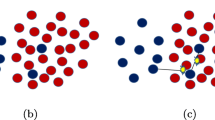Abstract
Aiming at the problem of low accuracy of classification learning algorithm caused by serious imbalance of sample set in medical diagnostic application, this paper proposes a distribution-sensitive oversampling algorithm for imbalanced data. The algorithm accurately divides the minority samples into noise samples, unstable samples, boundary samples and stable samples according to the location of the minority samples. Different samples are processed differently to select the most suitable sample for the synthesis of new samples. In the case of sample synthesis, a distribution-sensitive sample synthesis method is adopted. Different sample synthesis methods are selected according to their different distance from the surrounding minority samples, so as to ensure that the newly synthesized samples have the same characteristics with the original minority samples. The real medical diagnostic data test shows that this algorithm improves the accuracy rate of classification learning algorithm compared with the existing sampling algorithms, especially for the accuracy rate and recall rate of minority classes.






Similar content being viewed by others
References
Sun, Y., Wong, A. K., and Kamel, M. S., Classification of imbalanced data: A review. Int. J. Pattern Recogn. Artif. Intell. 23(04):687–719, 2009.
Garcia, S., and Herrera, F., Evolutionary undersampling for classification with imbalanced datasets: Proposals and taxonomy. Evol. Comput. 17(3):275–306, 2009.
Lopez, V., Fernandez, A., Garcia, S., Palade, V., and Herrera, F., An insight into classification with imbalanced data: Empirical results and current trends on using data intrinsic characteristics. Inform. Sci. 250:113–141, 2013.
Wang, S., and Yao, X., Multiclass imbalance problems: Analysis and potential solutions. IEEE Trans. Syst. Man Cybernet. B: Cybernet. 42(4):1119–1130, 2012.
Zhang, Z., Krawczyk, B., Garcia, S., Rosales-Perez, A., and Herrera, F., Empowering one-vs-one decomposition with ensemble learning for multi-class imbalanced data. Knowl.-Based Syst. 106:251–263, 2016.
Krawczyk, B., Learning from imbalanced data: Open challenges and future directions. Progress Artif. Intell. 5(4):221–232, 2016.
Chawla, N. V., Bowyer, K. W., Hall, L. O. et al., SMOTE: Synthetic minority over-sampling technique [J]. J. Artif. Intell. Res. 16(1):321–357, 2002.
Bunkhumpornpat, C., Sinapiromsaran, K., and Lursinsap C., Safe-level-SMOTE: Safe-level-synthetic minority over-sampling TEchnique for handling the class imbalanced problem[C]// Pacific-Asia conference on advances in knowledge discovery and data mining. Springer-Verlag, :475–482, 2009.
Han, H., Wang, W. Y., and Mao, B. H., Borderline-SMOTE: A new over-sampling method in imbalanced data sets learning[A]. Int. Conf. Intell. Comput. 3644(5):878–887, 2005.
Bunkhumpornpat, C., Sinapiromsaran, K., and Lursinsap, C., DBSMOTE: Density-based synthetic minority over-sampling TEchnique[J]. Appl. Intell. 36(3):664–684, 2012.
Bunkhumpornpat, C., and Sinapiromsaran, K. CORE: core-based synthetic minority over-sampling and borderline majority under-sampling technique.[M]. Inderscience Publishers, 2015.
Bennin, K.E. and Keung, J. et al., MAHAKIL: Diversity based Oversampling Approach to Alleviate the Class Imbalance Issue in Software Defect Prediction[J]. IEEE Transactions on Software Engineering, (99) :1–1, 2017.
Mathew, J., Pang, C. K., Luo, M. et al., Classification of imbalanced data by oversampling in kernel space of support vector machines[J]. IEEE Trans. Neural Netw. Learn. Syst. 29(9):4065–4076, 2018.
Douzas, G., Bacao, F., and Last, F., Improving imbalanced learning through a heuristic oversampling method based on K-means and SMOTE[J]. Information Sciences, 2018.
Jin, S., and Pedersen, T., Duluth UROP at SemEval-2018 task 2: Multilingual emoji prediction with ensemble learning and oversampling[J]. 2018.
Funding
Funded by NSFC (No. 61672020), the national key research and development program[2016YFB0800303], Supported by DongGuan Innovative Research Team Program.
Author information
Authors and Affiliations
Corresponding author
Ethics declarations
Declaration of Conflict of Interest
Weihong Han, Zizhong Huang, Shudong Li and Yan Jia declare no conflict of interest directly related to the submitted work.
Ethical Approval
This article does not contain any studies with human participants performed by any of the authors.
Additional information
Publisher’s Note
Springer Nature remains neutral with regard to jurisdictional claims in published maps and institutional affiliations.
This article is part of the Topical Collection on Systems-Level Quality Improvement
Rights and permissions
About this article
Cite this article
Han, W., Huang, Z., Li, S. et al. Distribution-Sensitive Unbalanced Data Oversampling Method for Medical Diagnosis. J Med Syst 43, 39 (2019). https://doi.org/10.1007/s10916-018-1154-8
Received:
Accepted:
Published:
DOI: https://doi.org/10.1007/s10916-018-1154-8




